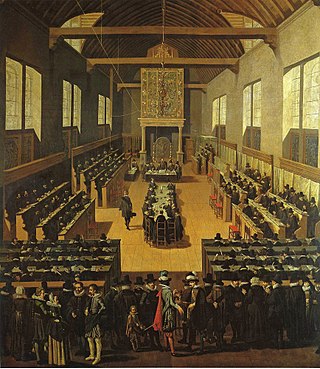Related Research Articles

Lancelot Andrewes was an English bishop and scholar, who held high positions in the Church of England during the reigns of Elizabeth I and James I. During the latter's reign, Andrewes served successively as Bishop of Chichester, of Ely, and of Winchester and oversaw the translation of the King James Version of the Bible. In the Church of England he is commemorated on 25 September with a lesser festival.

The Synod of Dort was an international Synod held in Dordrecht in 1618–1619, by the Dutch Reformed Church, to settle a divisive controversy caused by the rise of Arminianism. The first meeting was on 13 November 1618 and the final meeting, the 180th, was on 29 May 1619. Voting representatives from eight foreign Reformed churches were also invited. Dort was a contemporary Dutch term for the town of Dordrecht.

John Rainolds was an English academic and churchman, of Puritan views. He is remembered for his role in the Authorized Version of the Bible, a project of which he was initiator.

Samuel Ward (1572–1643) was an English academic and a master at the University of Cambridge. He served as one of the delegates from the Church of England to the Synod of Dort.
Richard Montagu was an English cleric and prelate.

John Overall (1559–1619) was the 38th bishop of the see of Norwich from 1618 until his death one year later. He had previously served as Bishop of Coventry and Lichfield, as Dean of St Paul's Cathedral from 1601, as Master of Catharine Hall from 1598, and as Regius Professor of Divinity at Cambridge University from 1596. He also served on the Court of High Commission and as a Translator of the King James Version of the Bible.
Francis Burleigh, sometimes spelled Burghley, was born in London around 1552. He studied at St. Catherine's College, Cambridge, then Queens' College, Cambridge, and finally Pembroke College, Cambridge. "He graduated B.A. in 1583, proceeded M.A. in 1587 and B.D. in 1594. He eventually became doctor of divinity in 1607 shortly after he had commenced his work on the translation".

John Richardson was a Biblical scholar and a Master of Trinity College, Cambridge from 1615 until his death.
Roger Andrewes was an English churchman and academic, archdeacon and Chancellor at Chichester Cathedral in the English Church. He was also a scholar, a Fellow of Pembroke Hall and was, in 1618, made Master of Jesus College, Cambridge.
Richard Kilby (Kilbye) (1560–1620) was an English scholar and priest.

Robert Abbot was an Anglican bishop, academic and polemical writer. He served as Master of Balliol College, Oxford, Regius Professor of Divinity, and Bishop of Salisbury from 1615. Among his four younger brothers, George became Archbishop of Canterbury and Maurice became Lord Mayor of London.

George Carleton was an English churchman, Bishop of Llandaff (1618–1619). He was a delegate to the Synod of Dort, in the Netherlands. From 1619 to 1628 he was Bishop of Chichester.
Peter Baro (1534–1599) was a French Huguenot minister, ordained by John Calvin, but later in England a critic of some Calvinist theological positions. His views in relation to the Lambeth Articles cost him his position as Lady Margaret's Professor of Divinity at the University of Cambridge. He was a forerunner of views, to be called Arminian or Laudian, more common a generation later in England.

James Montague was an English bishop.
Samuel Collins (1576–1651) was an English clergyman and academic, Regius Professor of Divinity at Cambridge and Provost of King's College, Cambridge.
Roger Fenton (1565–1615) was an English clergyman, one of the translators of the Authorised King James Version.
Robert Burhill or Burghill (1572–1641) was an English clergyman, known as a prolific controversialist.

The reign of King James I of England (1603–1625) saw the continued rise of the Puritan movement in England, that began during reign of Queen Elizabeth (1558–1603), and the continued clash with the authorities of the Church of England. This eventually led to the further alienation of Anglicans and Puritans from one another in the 17th century during the reign of King Charles I (1625–1649), that eventually brought about the English Civil War (1642–1651), the brief rule of the Puritan Lord Protector of England Oliver Cromwell (1653–1658), the English Commonwealth (1649–1660), and as a result the political, religious, and civil liberty that is celebrated today in all English speaking countries.

Arminianism was a controversial theological position within the Church of England particularly evident in the second quarter of the 17th century. A key element was the rejection of predestination. The Puritans fought against Arminianism, and King James I of England opposed it before, during, and after the Synod of Dort, 1618–1619, where the English delegates participated in formulating the Calvinist Canons of Dort, but his son Charles I, favored it, leading to deep political battles. The Methodists, who espoused a variant of the school of thought called Wesleyan–Arminian theology, branched off the Church of England in the 18th century.
Matthew Slade (1569–1628) was an English nonconformist minister and royal agent, in the Netherlands by 1600 and active there in the Contra-Remonstrant cause.
References
- . Dictionary of National Biography . London: Smith, Elder & Co. 1885–1900.
- McClure, Alexander. (1858) The Translators Revived: A Biographical Memoir of the Authors of the English Version of the Holy Bible. Mobile, Alabama: R. E. Publications (republished by the Maranatha Bible Society, 1984 ASIN B0006YJPI8 )
- Nicolson, Adam. (2003) God's Secretaries: The Making of the King James Bible. New York: HarperCollins ISBN 0-06-095975-4